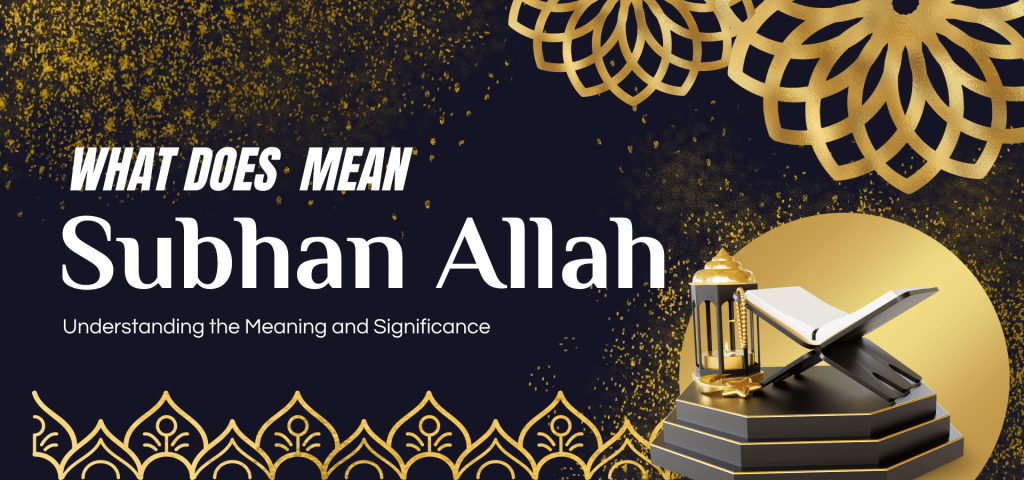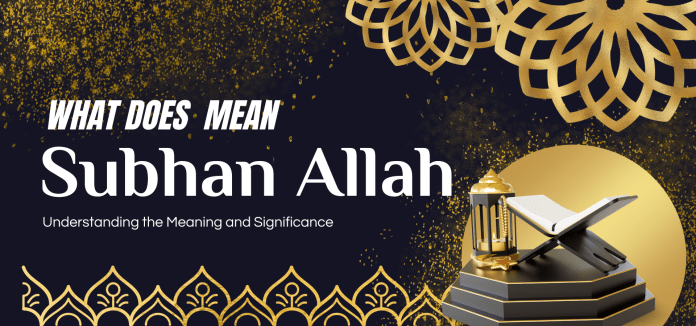Subhanallah is a commonly used phrase in the Islamic faith that holds deep significance for Muslims around the world. Derived from the Arabic language, this expression is frequently uttered in various contexts and carries a profound message.
In this article, we will explore the meaning of “Subhanallah” and delve into its spiritual and cultural significance. From its linguistic roots to its practical applications, we will uncover the essence behind this powerful phrase.
1. Linguistic Origins of “Subhanallah”
The phrase “Subhanallah” originates from the Arabic language. It consists of two main components: “Subhan” and “Allah.” “Subhan” represents the act of declaring something or someone as being far removed from any imperfections or deficiencies. On the other hand, “Allah” is the Arabic term for God, used by Muslims to refer to the Almighty Creator.

2. The Meaning of Subhan Allah
“Subhanallah” can be translated as “Glory be to Allah” or “Praise be to Allah.” It is an expression of acknowledging and affirming the greatness, perfection, and supreme attributes of God. By uttering “Subhanallah,” Muslims declare their recognition of the unparalleled nature and absolute purity of Allah.
3. Expressions of Praise and Gratitude
“Subhanallah” serves as a powerful expression of praise and gratitude towards Allah. Muslims use this phrase to demonstrate their awe and reverence for the Creator’s magnificence, benevolence, and infinite wisdom. It is an act of humbling oneself before the divine greatness and acknowledging the countless blessings bestowed upon them.
4. The Spiritual Significance of “Subhanallah”
In Islamic spirituality, “Subhanallah” holds deep spiritual significance. It serves as a means of connecting with the divine and seeking closeness to Allah. By reciting this phrase, Muslims aim to purify their hearts, elevate their consciousness, and deepen their devotion. It acts as a reminder of the omnipotence and transcendence of the Creator.
5. Recitation and Remembrance
Reciting “Subhanallah” is considered an act of remembrance (dhikr) in Islam. Muslims engage in dhikr as a form of worship and spiritual nourishment. The repetition of “Subhanallah” enables believers to redirect their focus from worldly matters and immerse themselves in the remembrance of Allah. It brings tranquility to the soul and strengthens the bond between the worshipper and the Divine.
6. The Role of “Subhanallah” in Daily Life
“Subhanallah” is not limited to formal acts of worship but is also incorporated into daily life. Muslims often utter this phrase in moments of awe, amazement, or gratitude when witnessing the beauty of nature, experiencing personal blessings, or encountering acts of kindness. It serves as a constant reminder of the presence of Allah and the inherent sanctity of the world around them.
7. “Subhanallah” as a Source of Peace and Tranquility
The repetition of “Subhanallah” has a soothing and calming effect on the mind and heart. Muslims turn to this phrase during times of distress, seeking solace and finding inner peace. It provides a sense of reassurance, reminding believers that they are never alone, and that Allah is the ultimate source of comfort and support.
8. Cultural Relevance and Community Bonding
“Subhanallah” plays a significant role in Islamic culture, acting as a unifying phrase for Muslims worldwide. It transcends linguistic barriers and connects people of diverse backgrounds, fostering a sense of community and shared faith. This expression of praise is often recited collectively during religious gatherings, emphasizing the communal aspect of worship.
9. The Impact of “Subhanallah” on Personal Growth
Regular recitation of “Subhanallah” can have a transformative effect on an individual’s spiritual journey. It encourages self-reflection, humility, and gratitude, nurturing qualities of mindfulness and introspection. By incorporating this phrase into daily life, Muslims strive for personal growth, seeking to deepen their connection with Allah and enhance their character.
10. Teaching “Subhanallah” to the Younger Generation
Passing down the significance of “Subhanallah” to younger generations is vital in nurturing their spiritual development. Parents, teachers, and community leaders play a crucial role in educating children about the essence and meaning of this phrase. By instilling a love for “Subhanallah” from an early age, children are encouraged to develop a strong foundation of faith and a deep connection with Allah.
People also want to know about What is TVpayz.com?
11. Incorporating “Subhanallah” in Worship
“Subhanallah” is frequently recited in various acts of worship in Islam. From the obligatory prayers (salah) to voluntary supplications (dua), Muslims integrate this phrase into their devotional practices. It serves as a reminder of the divine attributes of Allah and enhances the spiritual experience during acts of worship.
12. The Role of “Subhanallah” in Interfaith Dialogue
“Subhanallah” can also serve as a bridge for interfaith dialogue and understanding. By explaining the significance of this phrase, Muslims can foster mutual respect and enrich conversations with individuals of different beliefs. It provides an opportunity to share the beauty and depth of Islamic spirituality, promoting harmony and cooperation among diverse communities.

13. Benefits of Reciting “Subhanallah”
Reciting “Subhanallah” yields numerous benefits for individuals. It helps in purifying the heart, increasing mindfulness, and strengthening the bond with Allah. This simple yet profound phrase enables believers to find solace, gratitude, and contentment in their daily lives. It serves as a source of inspiration and motivation, reminding Muslims to strive for excellence in their thoughts, actions, and character.
14. Misconceptions Surrounding “Subhanallah”
As with any religious phrase, “Subhanallah” may have misconceptions associated with it. Some individuals might perceive it as a mere habit or cultural expression without comprehending its profound significance. It is essential to address these misconceptions and educate people about the true meaning and purpose behind “Subhanallah.”
15. Conclusion
In conclusion, “Subhanallah” is far more than a simple phrase; it encapsulates the profound connection between believers and Allah. With its linguistic origins, spiritual significance, and cultural relevance, this expression of praise and gratitude holds a cherished place in the hearts of Muslims worldwide. By understanding the true meaning of “Subhanallah” and incorporating it into daily life, individuals can embark on a transformative journey of spiritual growth and deepen their relationship with the Divine.
-
Is “Subhanallah” only used by Muslims?
Yes, “Subhanallah” is primarily used by Muslims as an expression of praise and gratitude towards Allah.
-
Can “Subhanallah” be translated into other languages?
While the exact translation may vary, “Subhanallah” can be conveyed in different languages to signify the praise and glory of Allah.
-
How often do Muslims recite “Subhanallah”?
Muslims recite “Subhanallah” throughout the day as a form of remembrance and devotion to Allah. The frequency may vary based on personal practice and devotion.

